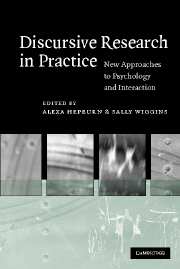Book contents
- Frontmatter
- Contents
- List of figures
- List of contributors
- Acknowledgements
- 1 Discursive research: themes and debates
- Part I Psychology in action
- 2 Managing subjectivity in talk
- 3 Emotions in meeting talk
- 4 Negotiating consciousness: parapsychology and the social organisation of reports of mental states
- 5 Apologising-in-action: on saying ‘sorry’ to Indigenous Australians
- 6 Mind, mousse and moderation
- Part II Professionals and clients
- Part III Youth and institutions
- Appendix: transcription notation
- References
- Index
4 - Negotiating consciousness: parapsychology and the social organisation of reports of mental states
Published online by Cambridge University Press: 04 November 2009
- Frontmatter
- Contents
- List of figures
- List of contributors
- Acknowledgements
- 1 Discursive research: themes and debates
- Part I Psychology in action
- 2 Managing subjectivity in talk
- 3 Emotions in meeting talk
- 4 Negotiating consciousness: parapsychology and the social organisation of reports of mental states
- 5 Apologising-in-action: on saying ‘sorry’ to Indigenous Australians
- 6 Mind, mousse and moderation
- Part II Professionals and clients
- Part III Youth and institutions
- Appendix: transcription notation
- References
- Index
Summary
Introduction
Parapsychology is concerned with a class of subjective psychological experiences which seem to suggest that humans have anomalous communicative abilities: the facility to interact with other humans or the environment without the use of the normal five senses. Experiences such as telepathy (mind-to-mind communication) and psychokinesis (mind-to-matter interaction) are said to be anomalous because there appears to be no biological or physical mechanisms by which to account for these ostensibly paranormal phenomena. (Introductions to and overviews of parapsychology can be found in Edge et al., 1986; Irwin, 1999; and Radin, 1997.)
In the parapsychological literature, the term ‘psi’ is used to refer to the as yet little understood processes which, it is proposed, underpin the variety of extra-sensory phenomena. Psi is assumed to be a function of the brain. Consequently, parapsychologists are extremely interested in a range of cognitive and mental phenomena which may be related in some way to the operation of psi, such as volition, intuition, states of consciousness, dream states, imagery, and so on. It is felt that if psi does exist, then its effects may be detected in or influenced by precisely these kinds of psychological entities or processes. Examination of, say, the relationship between consciousness and extra-sensory phenomena may reveal more about psi and how it works.
For example, there is evidence to suggest that psi is more likely to occur when people are in some form of relaxed or altered state of consciousness.
- Type
- Chapter
- Information
- Discursive Research in PracticeNew Approaches to Psychology and Interaction, pp. 70 - 87Publisher: Cambridge University PressPrint publication year: 2007

